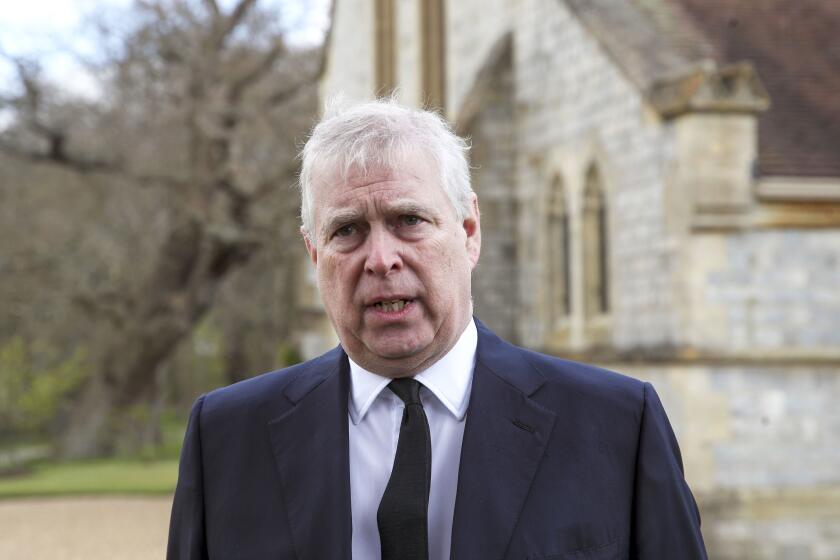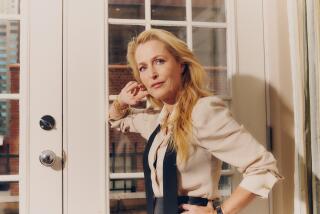‘Scoop’ depicts Prince Andrew’s infamous interview. These were the women behind it
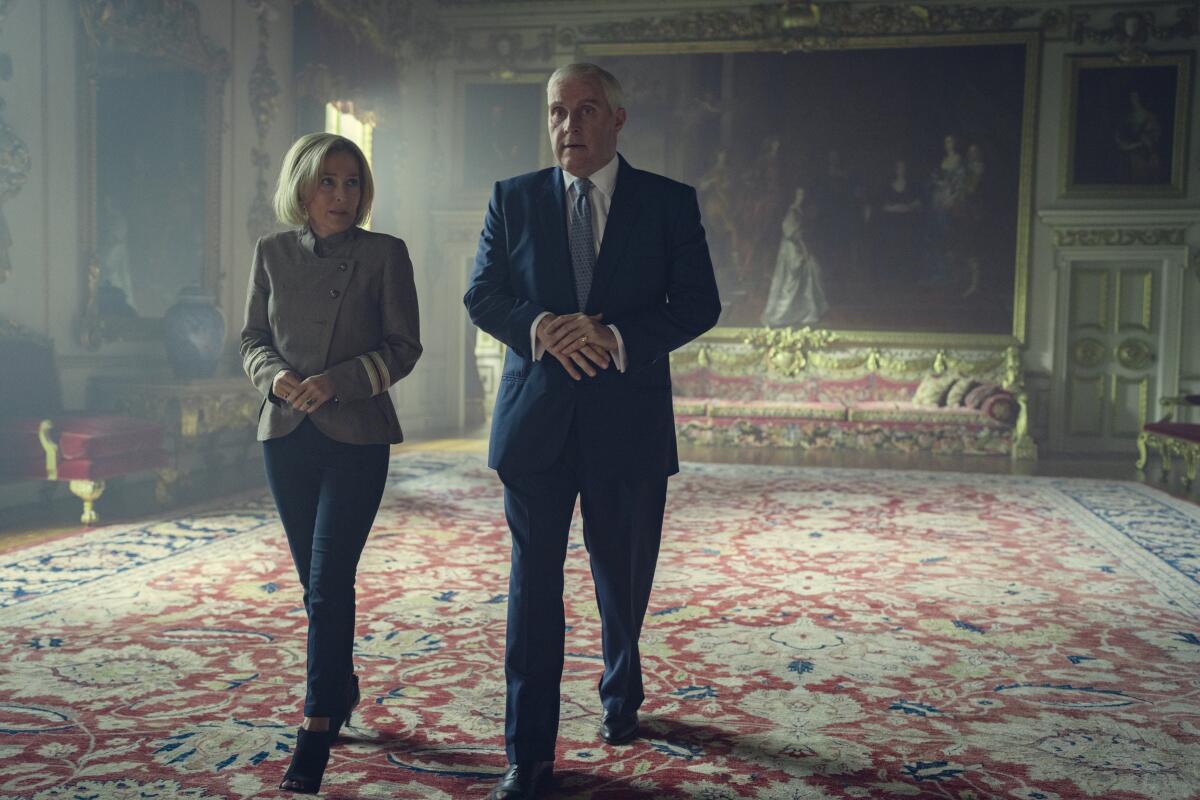
- Share via
In 2019, Prince Andrew agreed to a sit-down interview with Emily Maitlis on “Newsnight,” a BBC current events program. The conversation was catastrophic for the British royal, who attempted to defend himself from allegations that he’d had sex with a 17-year-old girl trafficked by his pal, the American financier and convicted sex offender Jeffrey Epstein. Prince Andrew’s bizarre responses, including a claim that he’s unable to sweat, became global headlines and memes, altering his reputation and status in the royal family.
But what happened behind the scenes is just as compelling. The interview, which was orchestrated by “Newsnight” booker Sam McAlister, took a lot of planning to bring to life, as seen in Netflix’s “Scoop,” a drama premiering Friday that was inspired by McAlister’s 2023 book “Scoops: The BBC’s Most Shocking Interviews From Steven Seagal to Prince Andrew.” Directed by Philip Martin with a screenplay by Peter Moffat, “Scoop” reveals the events that transpired leading up to and during the famous interview.
“‘Newsnight’ is a very famous brand here in the United Kingdom,” McAlister says. “In terms of very serious journalism at the BBC, it’s one of a small number of outlets that do this kind of hard-hitting interview content. And, in a sense, that’s the reason he shouldn’t have agreed to do it.”
‘Scoops’ author and ‘booker extraordinaire’ Sam McAlister takes The Times behind the scenes of Prince Andrew’s notorious 2019 ‘Newsnight’ interview.
In the film, Billie Piper plays Sam, a “Newsnight” interview booker and single mom from a working class background. After Epstein’s arrest, she convinces Prince Andrew’s private secretary Amanda Thirsk (Keeley Hawes) that the troubled royal (Rufus Sewell) could clear his name on television. The “Newsnight” team, including Maitlis (Gillian Anderson) and producer Esme Wren (Romola Garai), scramble to make the most of the opportunity with only 72 hours to prepare.
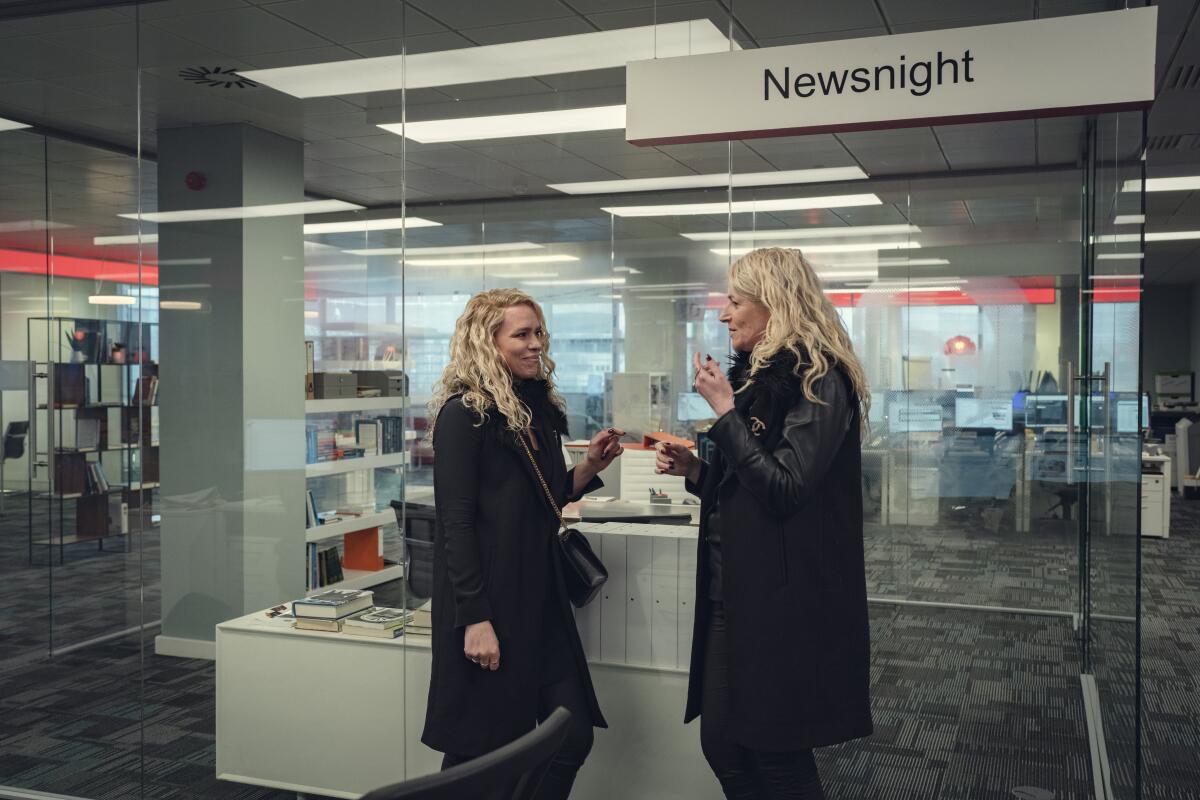
“It almost seems too convenient for the story purposes, but it really was four very different women working out a way together to give the victims a voice,” Piper says. “Working on behalf of people who can’t or who wouldn’t have that access otherwise or can’t speak up for themselves, and forcing someone in a position of power to be accountable for his behavior. It’s a remarkable piece of journalism.”
In reality, it was the tenacity and skill of McAlister and Wren, and the journalistic prowess of Maitlis, that successfully derailed Prince Andrew. Anderson points out that the BBC has historically been run by men, so having women at the top making decisions was an important moment. Although the interview is part of “recent history,” as Anderson says, documenting its creation is a reminder of what journalists like this can do.
“The film is a fun, thrilling ride, but at the end of the day the interview [is] for a very specific and dark reason,” Anderson says. “Part of what the film is about is the importance of independent journalism, and the ability to create a platform and a forum for the difficult questions to be asked of the people who are untouchable.”
Many will shame royal watchers for speculating about the Princess of Wales’ health. But catastrophic missteps by the royal communications apparatus created this mess.
The release of “Scoop” this week feels particularly relevant as the British royal family continues to struggle with how to engage with the media. As evidenced by the recent fervor over the whereabouts of Catherine, Princess of Wales, culminating in her pre-recorded cancer announcement, there remains a tension between the royals and the press.
Here McAlister, Piper and Anderson break down the four women involved in the Prince Andrew interview, as depicted in “Scoop.”
The booker
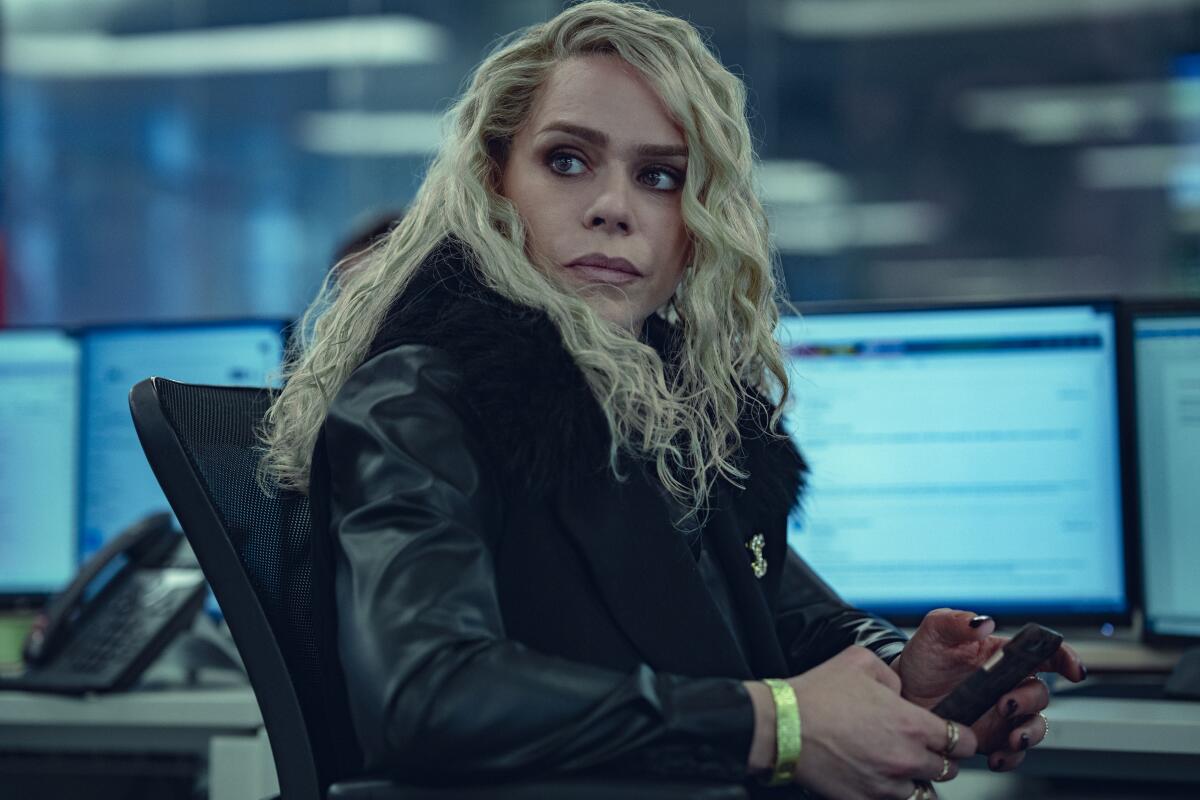
McAlister, who was trained as a lawyer, spent a decade as an interviews producer for “Newsnight.” Her job, as she puts it, was to “get bums on seats.” She identified potential interviewees and then negotiated their appearances on the show.
“It’s high risk coming on a program like that on live television with incredible presenters and extraordinary producers who are looking to basically call people to account and to make sure that they’re given rigorous interviews,” McAlister says. “So my job was basically to persuade people to do something that was effectively against their interests.”
Prince Andrew was the most notorious interview McAlister secured on “Newsnight,” but she landed many other big names, as detailed in her book. They included Sean Spicer, Stormy Daniels, Julian Assange, Benjamin Netanyahu and Elon Musk. “Everything across the board,” McAlister says. “But obviously this is the one that attracted some attention.”
McAlister, who left “Newsnight” in 2021, was heavily involved in “Scoop,” which meant that Piper could ask her questions, like how often she chewed gum (frequently).
“I didn’t have the pressures that Gillian and Rufus had because Sam wasn’t terribly public facing,” Piper says. “There were a few things online that I could dig into, but otherwise, [Sam] was a bit of an enigma. But I did get to spend a great deal of time with her before we started filming and then in the rehearsal period. [Sam was] just a gift as an actor because she has so many wonderful quirks that you blindly and ignorantly wouldn’t necessarily expect from someone working in that world. When you meet her she’s just very much her own person and quite uncompromising about that.”
The U.K. remains a class-based society and where someone went to school can affect where they end up working. This classism was something McAlister faced while at the BBC, which tends to hire people from upper-class backgrounds.
“She broke the mold,” Piper says. “We actually had a quite similar background in that sense. But her roots are the thing that clinched this interview. Because unlike the other people and the other women, who are wonderful but maybe less emotionally available, it’s her warmth, curiosity, and wit and good nature that I think [Prince Andrew] really responded to.”
McAlister was in the room at Buckingham Palace when the interview took place and she says it was her legal training that allowed her to keep a straight face. “You can’t show any emotion because it would be deeply unprofessional and it could put the interview in jeopardy if you share a reaction or you scoff,” she says. “I deserve some kind of award for not laughing.”
The journalist
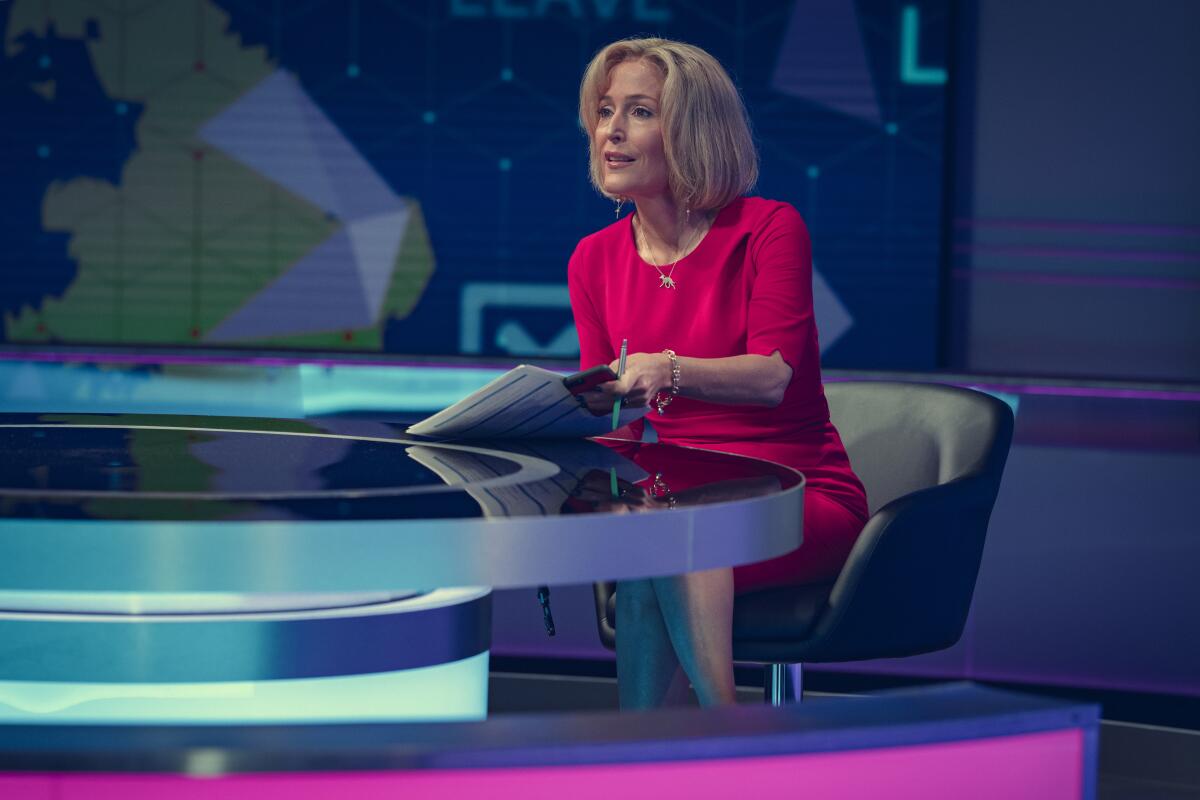
Maitlis, who was not involved in the making of “Scoop,” was the lead anchor on “Newsnight.” McAlister compares her to Christiane Amanpour. “She’s had a massive career here in the United Kingdom,” McAlister says. “She’s an icon of journalism. She is relentlessly clever and relentlessly stylish, that strange mix of intellect and celebrity, which is quite rare in this country.”
Anderson prepared to play Maitlis by listening to segments of the Prince Andrew interview on repeat, which she had an assistant edit together. For the actual interview sequence, she “studied and attempted to re-create” Maitlis’ real movements. “We knew which bits of the interview we were going to be doing, so therefore we memorized that in words and, for me and I think for Rufus too, in action,” Anderson says. “In gestures and tilts of heads to try and make it as accurate as possible.”
In the film, Maitlis wears a pantsuit to the interview and Prince Andrew comments on the trousers when she arrives. Although he didn’t actually say that, McAlister says the line represents how women in the media can be treated.
“Like many women in journalism, every element of Emily’s appearance is pored over on social media,” McAlister says. “It was definitely important we felt, sadly, that she wore something that was very conservative so we didn’t have an onslaught of criticism about her attire being inappropriate given the seriousness of the interview and the content. [That line] is the spirit of the situation.”
Looking back, Anderson can see why the interview was so successful for Maitlis. The actor notes that the anchor’s voice was unexpectedly soft, even as she asked tough questions and circled back when she didn’t get the answers she wanted. As portrayed in the film, Maitlis purposely let Prince Andrew talk without interruption to allow him to feel heard and create trust.
“She’s a tough interviewer,” Anderson says. “She doesn’t let people off. She doesn’t suffer fools. But she was gentle. And, obviously, that would have been on purpose and must have contributed to why he felt relaxed enough to answer in the way he did. … She was definitely on her toes and calculating in a good way, and strategic in how she moved it forward.”
Maitlis left the BBC in 2021. She now co-hosts daily podcast “The News Agents” alongside fellow journalists Jon Sopel and Lewis Goodall. “She runs on a regular basis and sometimes she does interviews while running,” Anderson says. “I’ve listened to it for a while. Everybody is familiar with her.”
The editor
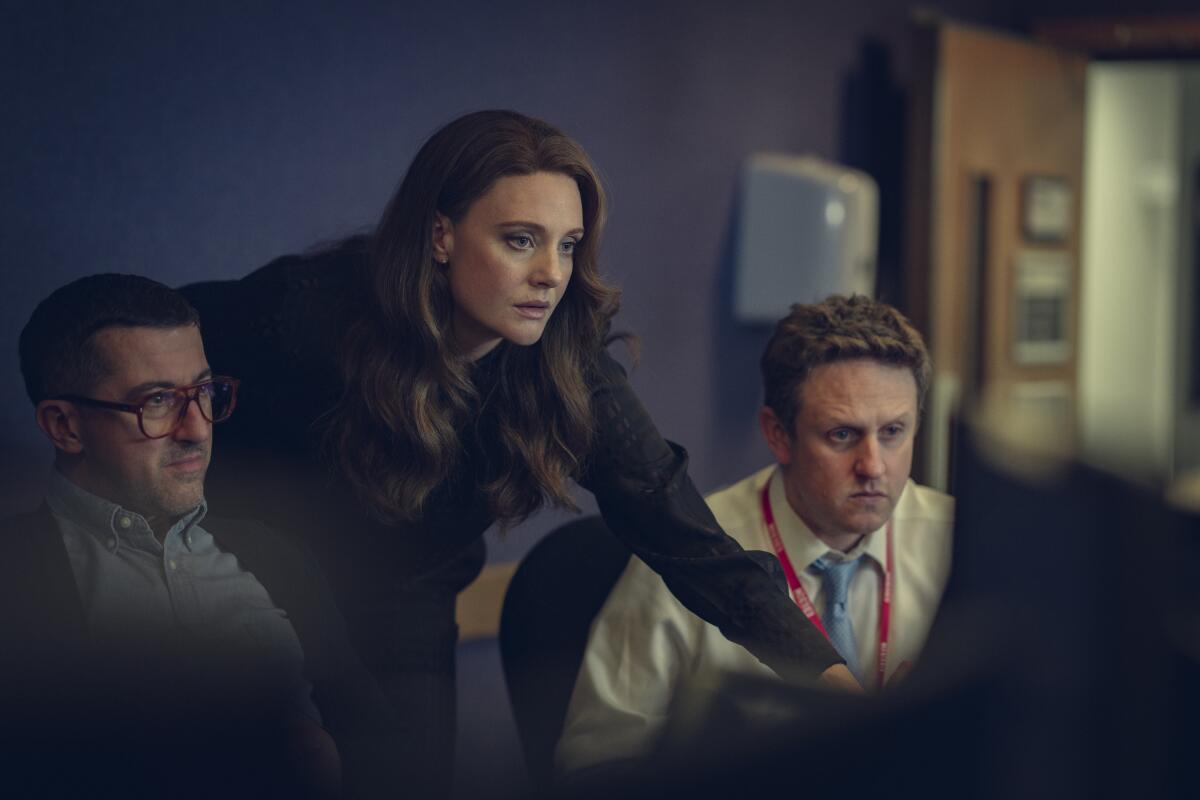
Wren, editor at “Newsnight,” had led the news program since 2018, when she moved over from Sky News. McAlister describes her as the “big boss” who led “Newsnight” in its coverage.
“She was the top of the food chain on our program,” McAlister says. “There were people above her at the BBC in terms of managers, most of whom we never knew what they did but they seemed to be paid a great deal of money and to have a great time. But she was the real deal. Imagine an editor who was so cool she didn’t even come to Buckingham Palace for the interview. That’s a woman with no ego.”
In the movie, as in reality, Wren stays at the BBC office while Maitlis and the crew head to the palace to interview Prince Andrew. “She didn’t come to any of the negotiations,” McAlister says. “She stayed behind and, in a sense, she sacrificed herself because of her relentless professionalism. And I think that’s a real point of difference to a lot of people in the media.”
Today, Wren is the editor of Channel 4 News, a rival to “Newsnight,” and in fact, McAlister notes that “none of the protagonists in the film have remained in our jobs.”
The aide
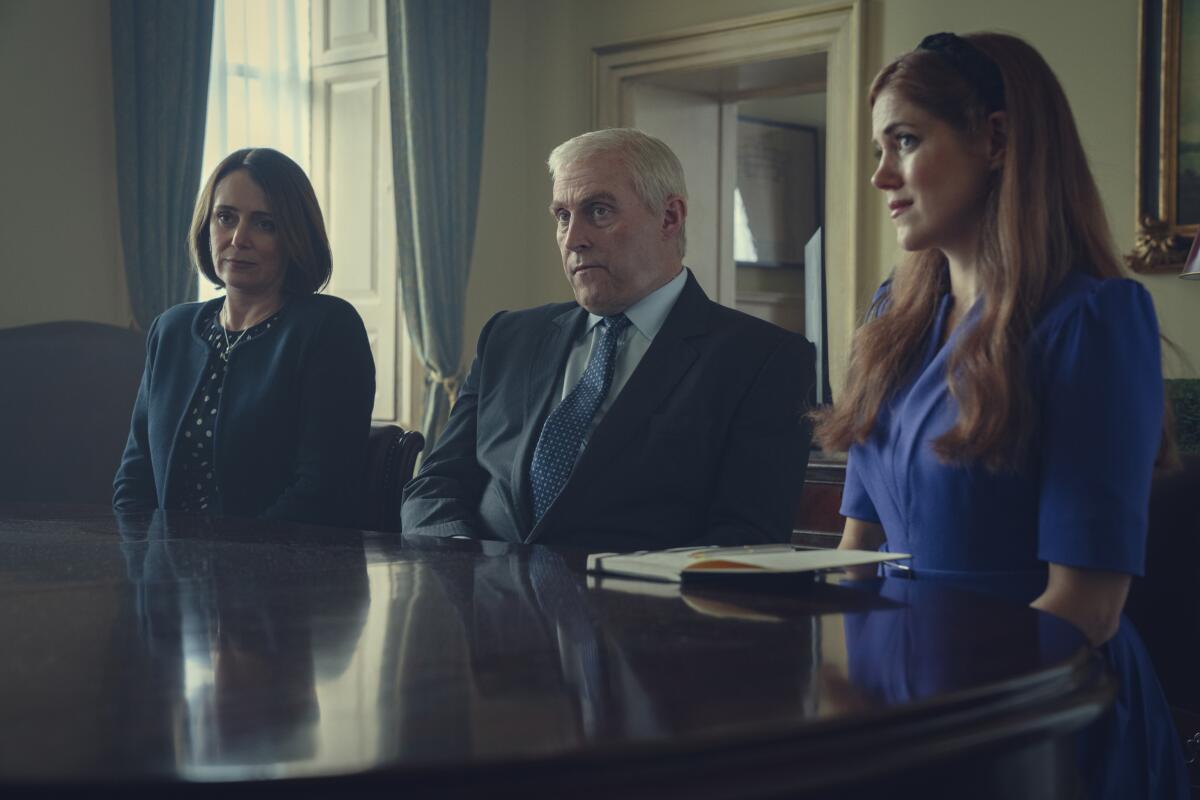
In the film, McAlister’s relationship with Thirsk is complicated. Thirsk was Prince Andrew’s private secretary for six years, eventually stepping down from the role after the BBC interview. But while it was her job to protect Prince Andrew’s interests and public image, she and McAlister bonded on a human level.
“Sam was a really big fan of Amanda and I think they spoke a few times even when everything had happened,” Piper says. “Sam has a lot of respect for her, and I don’t think there’s bad blood there. They’re both single moms. They’re both working women in relatively high-power positions. There was a lot that they connected over, and they seemed fond of each other.”
McAlister says she was “impressed” by Thirsk, noting that “she’s an icon of integrity and good behavior.”
“But ultimately, she believed in Prince Andrew, and that’s the job,” McAlister says. “And she did her job so well. But that created the problem for her because she thought perhaps that he would do a brilliant interview. And he thought he had done a brilliant interview. But, obviously, the public perception of that interview was very different from his perception.”
More to Read
The complete guide to home viewing
Get Screen Gab for everything about the TV shows and streaming movies everyone’s talking about.
You may occasionally receive promotional content from the Los Angeles Times.
